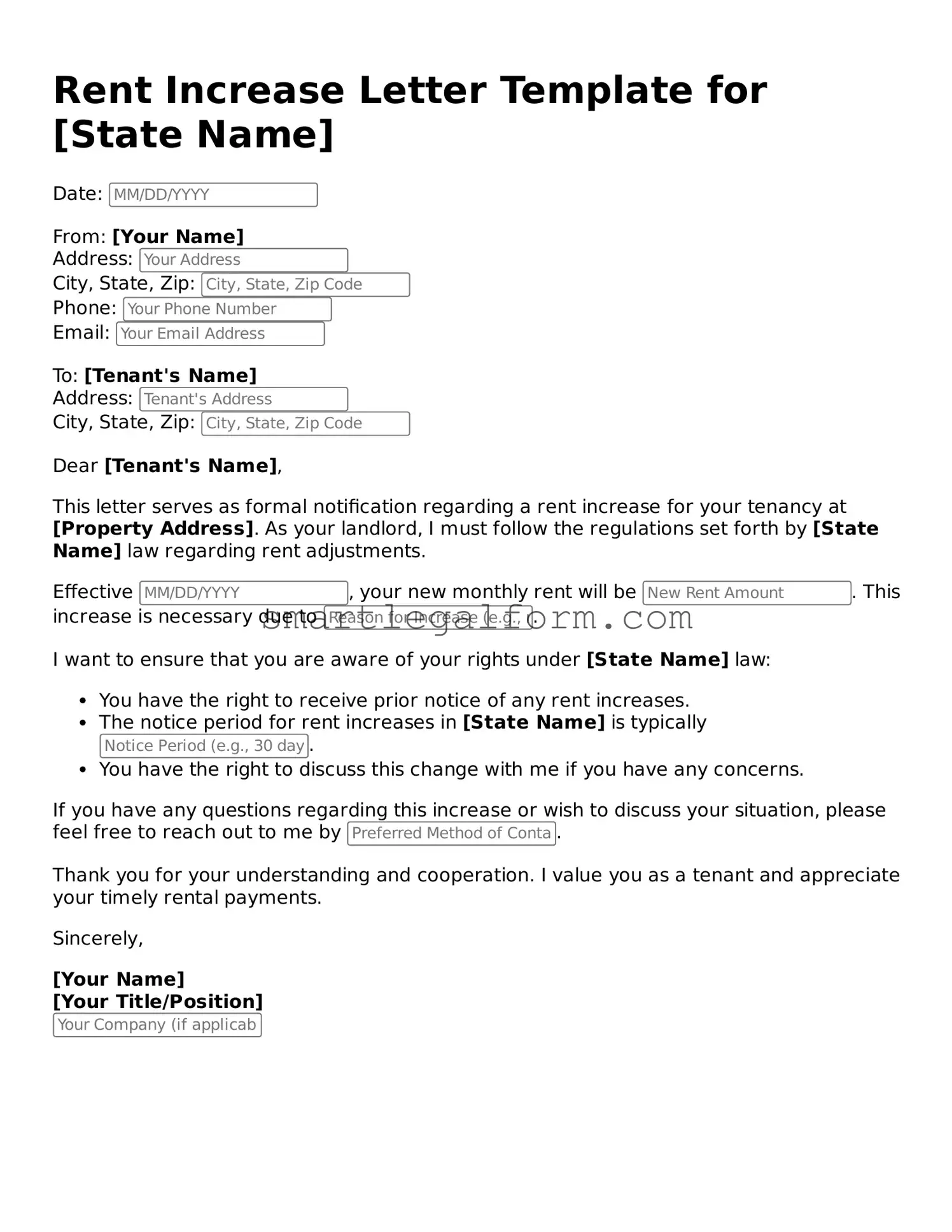Attorney-Approved Rent Increase Letter Form
Form Preview Example
Rent Increase Letter Template for [State Name]
Date:
From: [Your Name]
Address:
City, State, Zip:
Phone:
Email:
To: [Tenant's Name]
Address:
City, State, Zip:
Dear [Tenant's Name],
This letter serves as formal notification regarding a rent increase for your tenancy at [Property Address]. As your landlord, I must follow the regulations set forth by [State Name] law regarding rent adjustments.
Effective , your new monthly rent will be . This increase is necessary due to .
I want to ensure that you are aware of your rights under [State Name] law:
- You have the right to receive prior notice of any rent increases.
- The notice period for rent increases in [State Name] is typically .
- You have the right to discuss this change with me if you have any concerns.
If you have any questions regarding this increase or wish to discuss your situation, please feel free to reach out to me by .
Thank you for your understanding and cooperation. I value you as a tenant and appreciate your timely rental payments.
Sincerely,
[Your Name]
[Your Title/Position]
Common mistakes
Filling out a Rent Increase Letter form can be straightforward, but mistakes can happen. One common error is not providing the required information. Landlords need to include their name, address, and contact details, as well as the tenant's information. Omitting any of these details can lead to confusion and delays in processing the request.
Another frequent mistake is failing to specify the amount of the rent increase. The letter should clearly state how much the rent will go up and when the new amount will take effect. If this information is vague or missing, tenants may not understand their new obligations, which can lead to disputes.
People often overlook the importance of adhering to local laws regarding rent increases. Different areas have specific regulations that dictate how much and how often landlords can raise rent. Ignoring these rules can result in legal challenges or the need to retract the increase altogether.
Timing is also crucial. Sending the Rent Increase Letter too close to the effective date can catch tenants off guard. Most jurisdictions require landlords to provide advance notice, typically 30 days or more. Missing this deadline can invalidate the increase.
Lastly, many landlords forget to sign the letter. A signature adds a personal touch and confirms that the letter is official. Without it, tenants may question the validity of the notice. Ensuring all details are correct and complete helps maintain a good relationship between landlords and tenants.
Dos and Don'ts
When filling out a Rent Increase Letter form, it's essential to approach the task with care. Here are seven important do's and don'ts to keep in mind:
- Do ensure you have the correct tenant's name and address.
- Do check local laws regarding rent increases before proceeding.
- Do provide a clear and concise reason for the increase.
- Do specify the new rent amount and the effective date.
- Don't use vague language; be direct and specific.
- Don't forget to sign and date the letter.
- Don't ignore the required notice period mandated by law.
Following these guidelines will help ensure that your Rent Increase Letter is both effective and compliant with local regulations.
More Types of Rent Increase Letter Forms:
Garage Rental Agreement - Documentation of prior agreements about the use of the garage can be summarized.
A Lease Agreement form is a legal document that outlines the terms and conditions of renting a property between a landlord and a tenant. It serves as a crucial framework for both parties, ensuring clear expectations regarding payment, maintenance responsibilities, and the duration of the tenancy. Understanding this form is essential for fostering a positive landlord-tenant relationship, and you can find a helpful template at https://documentonline.org/blank-lease-agreement/.
Does Word Have a Lease Agreement Template? - Specifics on the size and specifications of the storage unit are provided.
Similar forms
-
Lease Renewal Letter: This document notifies tenants of the opportunity to renew their lease agreement. Like the Rent Increase Letter, it communicates important changes regarding the terms of occupancy, including potential adjustments in rent.
-
Notice of Rent Adjustment: Similar to the Rent Increase Letter, this document formally informs tenants of a change in rent. It specifies the new rental amount and the effective date, ensuring tenants are aware of their financial obligations.
-
Florida Lease Agreement: This document formalizes the arrangement between landlord and tenant in Florida, detailing essential terms such as rent, duration, and obligations. It is crucial for ensuring both parties are on the same page, thereby minimizing potential conflicts. For more information, visit https://onlinelawdocs.com.
-
Eviction Notice: While the purpose differs, both documents serve as formal notifications to tenants. An Eviction Notice communicates the termination of tenancy, whereas the Rent Increase Letter addresses changes in rental terms.
-
Maintenance Notification: This document informs tenants about scheduled maintenance or repairs. Both documents aim to keep tenants informed about their living conditions, though one focuses on financial changes and the other on property upkeep.
-
Tenant Welcome Letter: This document welcomes new tenants and outlines the terms of their lease. Similar to the Rent Increase Letter, it establishes expectations and clarifies important information regarding the tenancy.
